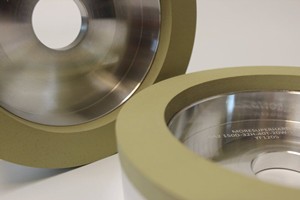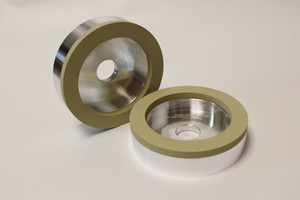The Relationship between RPM and Surface Finish of Wheel
There is a direct relationship between the rpm of a wheel , and the surface finish achieved from the tool. The principle is centered over the size of the chip generated from the cutting tool.

Consider a diamond wheel rotating at 3000 rpm and grinding glass at a constant grinding speed (u) of 10 m/min. The size of the chip generated has, for example a hypothetical size B. This is Condition 1. In Condition 2 we increase the rpm to 3500, and keep (u) the same at 10 m/min. The diamond particle that generates the chip will grind through the glass faster than at Condition 1, as the rpm at Condition 2 is faster than at Condition 1. Hence the chip size(C)at Condition 2 will be smaller than chip size (B) at Condition 1. Smaller the chip size, superior the surface finish. Hence the higher the rpm, better the surface finish. On the other hand, lower the rpm (2500), slower the motion of the diamond particle grinding through the glass, bigger the chip size (A), and therefore inferior the surface finish.
Therefore, one should maintain the rpm at the recommended level. Further, if there is a requirement to improve the surface finish, the rpm can be increased to achieve the desired results.
The extent to which the rpm needs to be increased is subjective and depends on local conditions. However, there is a limit based on the diamond-bond specification, to which the rpm can be increased.

